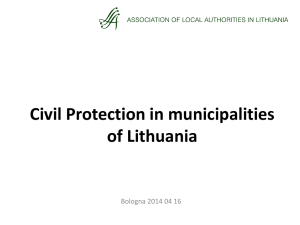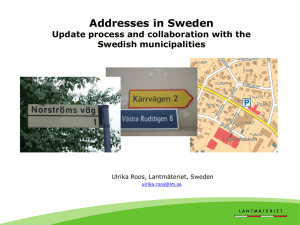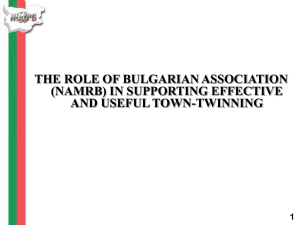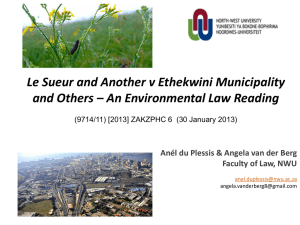Special features of Québec`s Child Friendly City accreditation
advertisement
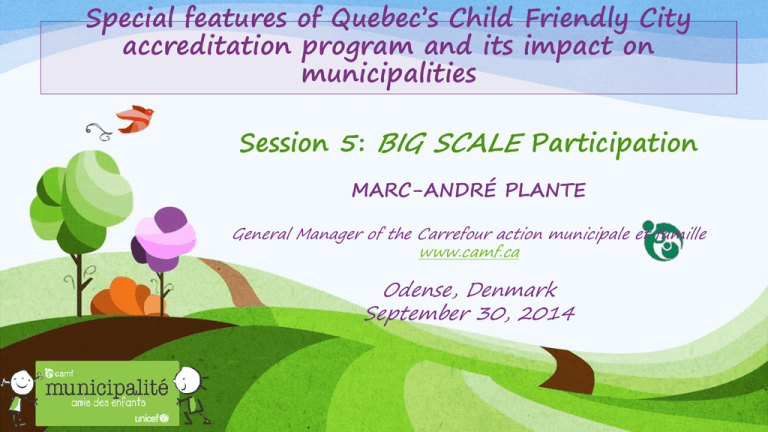
Special features of Quebec’s Child Friendly City accreditation program and its impact on municipalities Session 5: BIG SCALE Participation MARC-ANDRÉ PLANTE General Manager of the Carrefour action municipale et famille www.camf.ca Odense, Denmark September 30, 2014 Quebec Canada - Predominantly a French-speaking province in Canada French is the mother tongue of 79.7% of Quebec’s population* * Source: Statistics Canada The “Carrefour action municipale et famille” (CAMF) • Mission: Offer municipalities and regional county municipalities in Quebec support and accompaniment services to help them develop municipal family policies and to assist them in the process to become “Agefriendly municipalities”. • Objective: Improve the quality of living environments for families, children and the elderly in Quebec, in collaboration with partners of the municipal realm, of the Quebec government and of other networks who work with the same clienteles. The “Carrefour action municipale et famille” (CAMF) To support the members of 17 administrative regions, the “Carrefour action municipale et famille” (CAMF) uses the following strategies: • • • • Promotion & awareness-raising Training & accompaniment (annual seminar) Research & development Representing the network when dealing with government authorities Info about the province of Quebec Info about the CAMF • 320 members in 550 municipalities • Accompaniment of more than 250 municipalities and regional county municipalities in the development of municipal family policies • 1135 municipalities • Inhabited area of 116 910 square kilometres • Population predominantly located in southern Quebec • 53% of Quebecers live in cities with over 100,000 inhabitants History of the Child Friendly City (CFC) program in Quebec • Launched in Quebec in 2009 by the CAMF • It is the Quebec version of the Child Friendly Cities (CFC) international initiative • It was the first structured initiative in North America • The goal of the CFC program: encourage all levels of municipal government to integrate children’s rights in their policies, rules and objectives, as well as in their decision-making structure • The Government of Quebec and a foundation based on a public-private partnership provide financial support • Over the past five years, 24 municipalities have received an accreditation What determines if a municipality receives a CFC accreditation? The CFC program aims to recognize the history and the intentions of municipalities as so far as the importance given to children in the elaboration of services, by means of its municipal family policy (MFP)*. * Over the past 25 years, close to 800 municipalities have set up a local municipal family policy in which children were at the forefront of preoccupations. What are the objectives pursued by the CAMF with regards to the CFC program? • Raise awareness amongst decision makers of the municipal realm and increase their motivation to become a child friendly city • Support actions benefiting children that have already been undertaken, and improve them • Promote youth participation in municipal affairs and encourage municipalities to keep youth informed and listen to their opinions • Encourage the implementation of: • Policies, rules, projects and initiatives in favour of children • New lines of thinking with initiatives promoting the Convention on the Rights of the Child. • New ways of mobilizing resources • New types of partnerships involving children In short, accreditation is the result of an independent analysis process. The benefits and the positive spin-offs of a CFC accreditation There are many, but here a just a few: • It raises awareness amongst the municipal council regarding issues related to children • It results in an assessment of the interventions undertaken for the 0 to 17 years old clientele • It gives a municipality membership in the Quebec CFC network (members exchange good practices and share a bank of initiatives for children) • It helps raise new lines of thinking contributing to the global development of children in all municipal services • It gets more youth to participate in municipality projects and in decision making • It contributes to slow down the exodus of youth and families from rural areas Assessment of the CFC program Important notes… • Local administrations have cultures with deep roots and changes are hard to make in view of the current state of public finances. • Promoting children participation naturally implies involving parents for children under the age of 8. • Prioritizing a few elements from UNICEF’s 9 ambitions makes acknowledgement of municipalities easier, to then be able to make them evolve. • Networking between cities encourages sharing of innovative initiatives. • Establishing a structured accreditation process is complex and takes time, but the impact is more durable. Pistes d’actions Presentation of inspiring measures and projects for youth, within the various intervention spheres of a municipality in Quebec (Canada). Bank of inspiring initiatives The CFC program’s website shares a lot of inspiring actions! www.amiedesenfants.ca Promotion of children’s rights: Solidarity walk for children’s rights The walk helps raise awareness for children’s rights amongst the population. www.ensemblepourlesenfants. org Promotion of children’s rights: Children’s rights circuit 20 signs displaying specific children’s rights were set up in front of organizations for families, in order to reinforce the importance of children’s growth within the community. Children friendly institutions: “Friends of the children” certification This certification acknowledges institutions that take into account the needs of families – especially those with toddlers aged 0 to 5 years old – in terms of installations and services. Recreational activities and school success: Croque-livres network Inspired by the “take a book, leave a book” approach, Croque-livres is a network for book sharing. It is intended for children aged 0 to 12 years old. Transportation: Advice for the bus! A booklet providing solutions to help families get around more easily with children on the bus. Transportation: Taxi 12-17 Transportation service for teenagers aged 12 to 17. A healthy lifestyle: Food at school: actions that may be undertaken by municipalities A guide presenting a few alternatives for municipalities wanting to improve the food environment around schools. Children participation: Fresco paintings In the Centre du Québec region, to make the urban landscape of a municipality more beautiful, fresco paintings were created with the help of local youth. Conclusion Child friendly cities are now more visible than ever Thanks!






